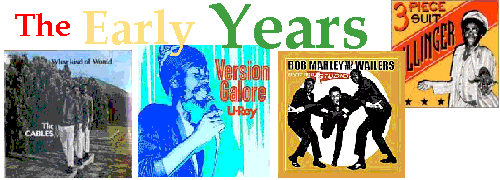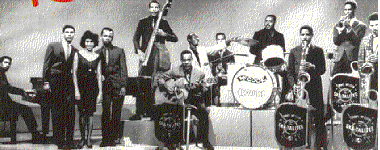

The Skatalites
| The ska revival that started in the U.K. has grown all over the world with every country having their own ska movement. Ska like Rock and roll will never die. But Ska was born in Jamaica, nurtured in the packed Kingston dancehalls filled with super cool 'Rude Boys'. In no other country is ska so identified with a national popular culture as it is in Jamaica. To Jamaicans, Ska was the sound of the man in the street |  |
 Justin Hines | When the music of ska first began rocking Jamiaca back in the late 50's and early 60's most people saw it as a passing dance phenomenon like the twist or the limbo. Ska was finally superceded by the more soulful sounds of Rocksteady in 1966. However, despite it's decline in popularity in Jamaica, Ska simply refused to die elsewhere. In Britain the music remained popular primarily amongst mods who found the raw and highly infectious dancing beat of the music in tune to their nonsense lifestyle. In the late 1960's the spirit of Ska was recaptured in the latest music style to emerge from Jamaica-Reggae. Like Ska, the appeal of reggae lay primarily in it's simplicity and honesty which presented a refreshing contrast to the era of psychedelia which had engulfed Britain to the point of suffocation. Reggae took the country by storm and for the next few years the music enjoyed success on a major scale. |
| By the mid 1970's, however, the party was over. Reggae had changed and as a result had lost its appeal amongst those who had taken it to their heart. The spirit of Ska had been lost once again and now seemed it was destined to be forever consigned to the annals of music history. However, Good Music nvere completely dies and in the late 70's , Ska was rediscovered. British bands such as The Specials, The Selecter, Madness, The Beat, and other bands, who had been raised on a staple diet of early Jamaican sounds throught their teens, btreathed new life into the music and in doing so brought Ska into the modern age. Since then Ska has become a completely international idiom. The world is rocking to the sound of Ska.(paraphrased from Laurence Cane-Honeysett 1995) |  The Paragons |
 Don Drummond | It was in the U.K. though that the main market for Jamaican popular music was to be found. Right up to the beginning of the 80's a reggae artist was'nt really a star unless he had scored a hit in britain, and in the 60's and 70's chart success for jamaican artists was largely the prerogative of record companies like Trojan Records. They scored a U.K. number one with Desmond Dekker with the Israelites though the skanking It Mek was a bigger hit among Dekker's hoardes of skinhead followers who also adopted Alton Ellis' Rock Steady and Freddie Notes and the Rudies' Montego Bay as moonstomping standards. They also pushed Bob & Marcia as the Sonny & Cher for their soulful recording of Pied Piper in the same stylr which earned them thier U.K. top 5 hit version of Nina Simone's Young, Gifted and Black. |
| From the mid sixties, the Wailers Bob Marley, Peter Tosh, and Bunny Wailer were the crown princes' of Jamaican Indegenous music. This trio of cool and conscious rude boys with attitude represented the fusion of Jamaican musical styles, as the homegrown back beat flirted simultaneously with the uptempo New Orleans R & B inspired Ska and with the Motown soul inspired rocksteady. It would be called reggae for a few more years. Three tracks, Caution, Stop the Train, and Keep on Moving bear the vocals and lyrical hallmarks which by the mid seventies were to earn Marley the crown of reggae King with Desmond Dekker as the king of Ska. The Ethiopians are best remebered for a pair of blazing rocksteady/ska tracks Train to Skaville and the immortal, often imitaded but never matched The Whip, the all-time irresistable party record, guaranteed to fill the dance hall. Christmas would not be complete without the seasonal broadcasting of Lord Tanamo's I'm In the Mood for Ska on the Paxo television advertisement. The Maytals' funky skinhead anthem Monkey Man mad a comback at the end of th 70's as part of The Specials' New Wave Ska repertoire. |  Desmond Dekker |
 Max Romeo and Lee Perry | Almost two quarters of a century later, the durabilty of these songs and the artists have endured. You can still hear Jimmy Cliff, The Maytals, Lee Perry, Bob & Andy, Maricia Griffiths, Desmond Dekker, Laurel Aitken, Augustus PAblo,Max Romeo, Alton Ellis, and the Skatalites actively touring and recording. No self-respecting reggae collection is complete without glancing towars the roots of reggae-SKA. Ska would be Jamaica's music which would be the foundation that would lead to rocksteady and later reggae. You can feel the excitement of musicians who knew that the music was changing music history even as they played their instruments, and singers who balanced precariously astride the converging but different musical styles. Who would have imagine the imact that Ska would have in Britain, the U.S., and the world. Ska, the people's music will live forever. SKA! partly paraphrased from Trojan's The Roots of Reggae. |

augustusska@hotmail.com